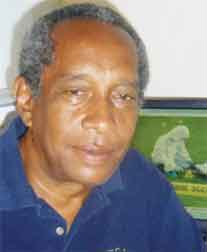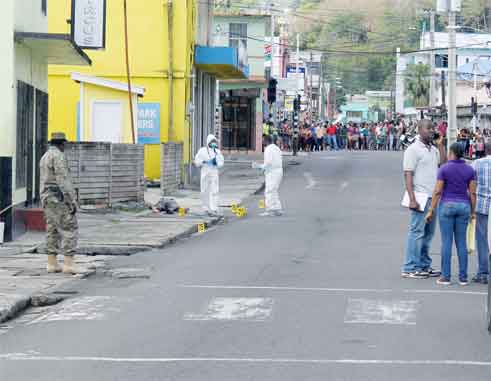
RECENTLY a friend indicated that he had not seen a recent article emanating from me on ‘matters forensic’. Since my inclination is to focus more on situations of a local and current nature as they would be of greater interest to readers, it is the frequency of such that really dictates how often I write.
Another reader found my articles particularly useful as they carry important information. This is good as it allows the reading public to have an informed and better appreciation of the science, the demands of a properly run forensic service and exactly where we are in that regard.
At a Trace Evidence Examiners conference I had attended, sessions were both informative and lively from the usual rivalry which almost always occurs when trace evidence examiners and DNA specialists meet. One of the more important discussions though was the call from some delegates for the return to the former days of having a forensic science presence at crime scenes, particularly those of serious or major crimes.
I fully identify with that call because quite apart from the need for crime scene expertise to effect reconstructions which incidentally is an area we must develop, the increasing importance of trace evidence which in some crime scenes is becoming less and less, coupled with the heavy reliance particularly on DNA makes crime scene management now more critical than ever. Participants found that there have been instances of unacceptable and telling crime scene mismanagement, moreso in major crimes and which had the potential for negating case work success. Not surprisingly when certain cases were presented for discussion, it showed that the line between success and failure insofar as forensics and consequently case work are concerned, can be a fine and delicate one.
From my knowledge any recommendations as those from the conference will have implications for crime scene operations here unless our crime scene response is beefed up through increased manpower, expertise and technology. That, and also bearing in mind there is a striking difference between crime scene examinations and crime scene investigations. Deficiencies in manpower are clearly evident and are supported by recent claims by the president of the Police Welfare Association and the public relations officer of manpower shortages in the police service. It will not be too difficult to fathom that in such situations specialist areas such as crime scene processing will be some of the early casualties of such shortages but that must be avoided as much as possible.
It takes time, effort and money to train crime scene officers and such investments must be protected and not frittered away whether through routine administrative transfers or man power shortages. However quite apart from what the trained eye can detect, from what I have seen, our crime scene officers must be commended on their approach and body attire which signals a committed professional respect for the crime scene. This will serve case work success well, maybe when they least expect and so it is hoped that such will be sustained.
![Appropriately attired officers at Chaussee crime scene. [Photo: Stan Bishop]](https://www.thevoiceslu.com/wp-content/uploads/2015/04/chaussee.jpg)
We are in the throes of deadly criminal activity. I have previously written that whereas the application of forensics is not always an absolute guarantee of investigative success it is an absolute guarantee that at least the right thing is being done towards achieving that success. The makeup of the type of crimes we are currently experiencing will not allow easy resolution and criminal investigators should/ and will know that. They should also know just how much assistance they can get from the public, how far it will take them and exactly what critical additional support they will need to enhance their quest for convicting evidence, but that I will not expand on. Suffice it that if our investigative law enforcement is to acquire the kind of success they desire, all deficiencies for which I know they are well aware of, must be identified for urgent correction. It is in their interest and the interest of our criminal justice system.
Not for the first time I have heard Commissioner Francois, Crime Chief Henry and now even the new Acting Commissioner Alexander having to defend the indefensible and really through no fault of theirs. As a sample: Obviously relating directly to our serious levels of criminal activity (past homicides and recent rapes, some being horrific) and now the very recent murders, Timothy Poleon on his television show last week inquired of Acting Commissioner Alexander about the assistance the police were getting from our forensic laboratory. However, his preferred response of shifting to the drug testing capability of the laboratory was, for me, strange.
But when he did address the intent of Poleon’s question his lukewarm answer about the gearing up of the laboratory for its role in providing future assistance was revealing. Gearing up for future assistance? A state of the art facility already five years in existence? But if Acting Commissioner Alexander‘s response is the guide, let alone the high current case work demands, one must wonder about the case work back log as surely there must be an overwhelming number.
Especially for past and current major crimes the authorities must understand that every available resource must be harnessed and effectively utilized in the fight against crime. Urgent will now hardly describe our dire situation. In the investigative sphere forensics will fail to properly assist if the service and particularly our huge laboratory investment continues to remain operationally weak and largely dysfunctional. Consequently addressing that situation, giving our crime scene response more beef and restoring whichever of the CCTV cameras that are inoperable will undoubtedly increase the island’s crime prevention and investigative capabilities and bring significant levels of comfort not only to investigative law enforcement but to the many victims of crime, their families and the public in general.







The station is dire and the greatest sadness for those awaiting justice, apart from the hurdles to be jumped and the hideous amout of time getting to trial, is the fact that cases can only be weakened by the obvious lack of thorough investigation and processing of forensics, crime scene etc. There is a real confidence issue here. This is really frightening especially when you read/see in the overseas media how thorough the necessary procedures are.
How many come out of the Court after a criminal trial feeling that no stone has been left unturned, that the very best chance has been given to their case? Or must people accept mediocrity?
The issue of resources must be addressed; the police are expected quite correctly to get results but are made to work with one hand tied behind their backs.
Well said Anon. It is a question of the proper utilization of all available resources to target what is needed. Mediocrity is ‘king’ in this country
Yes Louis, you hit the nail on the head. Too many unproductive civil servants.